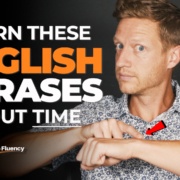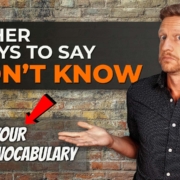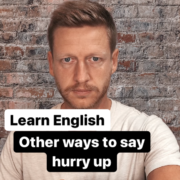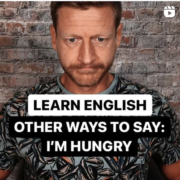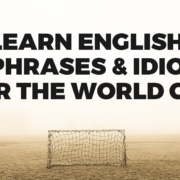In this English lesson, you’re going to learn 73 phrases related to cars and driving.
Watch the video, learn the expressions below, and then consider joining the program!
Phrases Related to Cars and Driving:
Find your keys / take them out of your pocket: I usually keep my keys in one place. But sometimes, I misplace them and have to find them. Here are more examples:
- I can’t find my keys!
- Have you seen my keys?
Unlock the car: these days, most cars are unlocked electronically.
- Can you unlock the car? I forgot to take my bag out.
- Do you lock your car at night?
Open the door: some of the newer cars have automatic doors but most don’t.
- Can you open the door for my grandma?
- Don’t open the door until we’ve stopped! (first conditional)
Get in the car: if you have young children, this can be challenging! To get back in the car is often used at service stations/rest stops.
- Come on, get in the car
- Let’s get back in the car
- I can’t get out of the car because I hurt my knee
Put on/fasten your seatbelt: Both of these terms are used.
- I can’t put my seatbelt on – it’s stuck!
- Come on, put on your seatbelt
- We’re not going anywhere until you put on your seatbelt
- Don’t take off your seatbelt yet
Take off / release the handbrake: this is called a parking brake in the USA.
- So, I was driving the other day and realized that I had forgotten to take off the handbrake. No wonder it was driving slowly.
- It’s hard to take off the handbrake!
Start the car: You can also turn it on.
- I’m sorry I’m late. The car wouldn’t start
- Come on, let’s go – start the car
- Turn the car off!
Automatic vs manual cars: automatic cars change gears automatically, whereas, with manual cars, you change gears manually
- I’ve never driven a manual car
- Automatic cars are much easier to drive
Put it into…..: this is how you talk about changing gears
- Put it into 2nd
- I put it into 5th as soon as possible on the motorway
- Drop it into 2nd at this roundabout (to go from 3rd to 2nd)
- Put it into drive
- Put it into reverse
- Put it into park
Step on the…: this is the verb used to talk about the various pedals in cars. You can also use hit.
- Step on the brake
- Step on the gas/accelerator a little more
- Hit the brake
You can also use the verb to brake or accelerate:
- I broke too late and ended up hitting the car in front
- Accelerate to get past that car
Turn/put on things: there are many buttons on the dashboard. You turn/put on or turn off these things.
- can you turn off the AC?
- let’s put on the heating
- should we put on the radio?
- turn on your hazards here
- Did you turn on your lights?
- is the AC on?
- You can turn your hazards off now
- Can you turn that off?
You can also turn up/down these things too.
- turn it down a bit
- can you turn up the AC?
- it’s roasting in here – I’m going to turn down the heating
Put the windows up/down: in the past, people also said wind the windows down but now, the verb is put.
- Want to turn off the AC and put the windows down?
- Can you put your window up? We’re on the highway now
- Let’s put the windows down
Indicators/turn signals: The latter is British English. Here are some examples:
- Is my left indicator working?
- No one indicates in America
- It’s important to indicate to let people know where you’re going
- put on your turn signal at this traffic circle (American English)
We’re doing/going 70 MPH: you can use both verbs here – MPH = miles per hour
- we’re doing about 70 mph
- he must be going at least 110 mph
- I was only going 73 mph and I got pulled over
- can you go a little faster?
Speed up and slow down: you can also go faster/slowers
- slow down a little – these are tight bends
- speed up a little – you’re only going 45 in a 60
- can you go a little slower? I’m getting car sick
Turn left – take your second right: Giving directions is always fun!
- turn left after this pub
- take this right
- go straight ahead at this roundabout
- you missed your turn again!
Rush hour traffic: Nobody likes getting stuck in traffic!
- I’m going to be a little late. I’m stuck in traffic.
- Has there been an accident? We’re just not moving.
- Try and avoid rush hour if you can
- It’s bumper to bumper
To set off: this means to start a journey
- Let’s set off at 7 AM
- Do you think we should set off early morning?
- Do you think we should set off before 7?
- Have you set off yet?
A long/short drive: this describes the length of the car journey
- It’s a long drive – let’s get a good night’s sleep
- It’s only a short drive – the kids should be fine
A backseat driver: someone who constantly talks to the driver telling them how they should drive.
- Stop being a backseat driver
- He’s a bit of a backseat driver
- You’re a bit close to that car in front
If you’re a member of the To Fluency Program, then log in to get the premium materials.
Not a member yet? Click here to learn why you should join!

